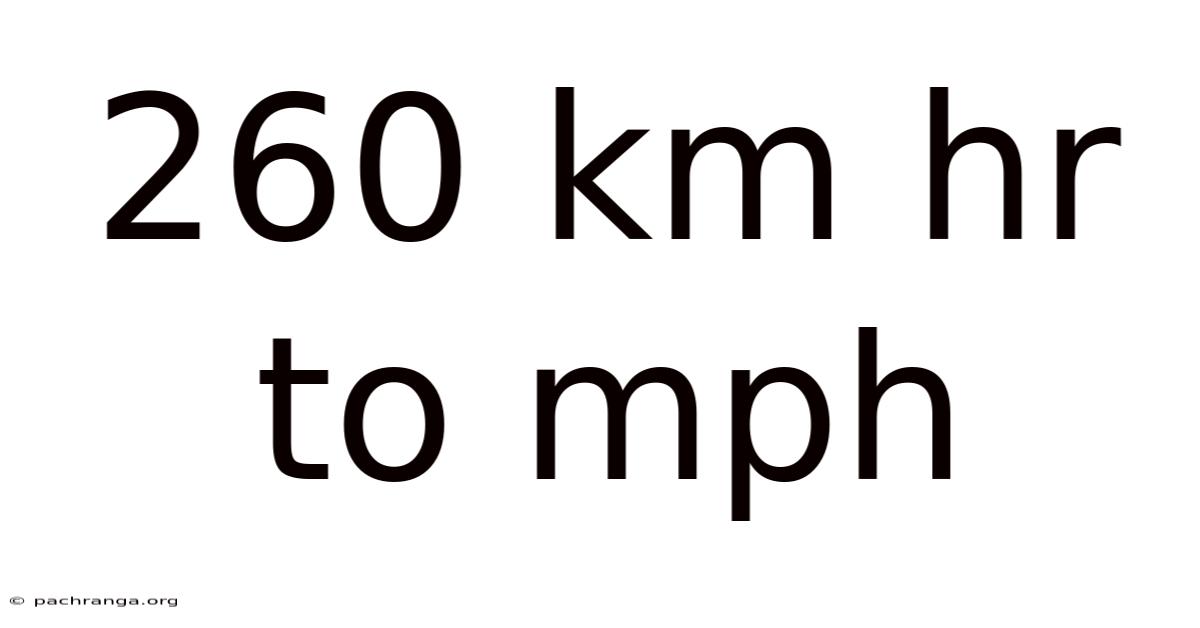260 Km Hr To Mph
pachranga
Sep 04, 2025 · 4 min read

Table of Contents
Converting 260 km/hr to mph: A Comprehensive Guide
Understanding speed conversions is crucial in various fields, from everyday driving to advanced physics. This article will comprehensively guide you through the process of converting 260 kilometers per hour (km/hr) to miles per hour (mph), explaining the underlying principles, providing step-by-step calculations, and addressing frequently asked questions. We’ll also delve into the practical applications of this conversion and explore some related concepts. By the end, you'll not only know the answer but also understand the 'why' behind the conversion.
Introduction: The Importance of Speed Conversions
The world uses different units for measuring speed. While kilometers per hour (km/hr) is prevalent in many countries, miles per hour (mph) is commonly used in others. The ability to convert between these units is essential for clear communication, accurate calculations, and international collaboration across various fields, including transportation, meteorology, and engineering. This conversion is particularly important when dealing with speeds like 260 km/hr, which represents a significant velocity often encountered in high-speed rail, motorsports, and aviation.
Understanding the Units: Kilometers and Miles
Before diving into the conversion, let's refresh our understanding of the base units involved. Kilometers (km) and miles (mi) are both units of length or distance. A kilometer is a unit in the metric system, while a mile is a unit in the imperial system. The key difference lies in their magnitudes: one mile is approximately longer than one kilometer. This difference is precisely what necessitates a conversion factor when changing between km/hr and mph.
Step-by-Step Conversion: 260 km/hr to mph
The conversion from km/hr to mph requires a single conversion factor that reflects the relationship between kilometers and miles. This factor is approximately 1 mile = 1.60934 kilometers. Here's how to convert 260 km/hr to mph:
-
Identify the conversion factor: We know that 1 mile ≈ 1.60934 kilometers.
-
Set up the conversion: We want to convert 260 km/hr to mph. We can set this up as a fraction:
260 km/hr * (1 mile / 1.60934 km) -
Perform the calculation: Notice that the "km" units cancel out, leaving us with "miles/hr":
260 / 1.60934 ≈ 161.57 miles/hr -
State the result: Therefore, 260 km/hr is approximately 161.57 mph.
Alternative Approach: Using a Proportion
Another way to approach this conversion is by setting up a proportion. Knowing that 1 mile ≈ 1.60934 kilometers, we can establish the following proportion:
1 mile / 1.60934 km = x miles / 260 km
Solving for 'x' (the number of miles):
x = (1 mile * 260 km) / 1.60934 km
x ≈ 161.57 miles
Therefore, 260 km/hr is approximately 161.57 mph. Both methods yield the same result.
Precision and Rounding
The conversion factor we used (1 mile ≈ 1.60934 kilometers) is an approximation. The actual value has more decimal places. Depending on the required level of accuracy, you might need to use a more precise conversion factor and round your final answer accordingly. For most practical purposes, 161.57 mph provides sufficient accuracy. However, in scientific or engineering contexts, more decimal places might be necessary.
Practical Applications of the Conversion
The ability to convert 260 km/hr to mph, and more generally, between km/hr and mph, finds application in diverse scenarios:
- International Travel: Understanding speed limits and the speeds of vehicles in different countries requires accurate conversions.
- Automotive Industry: Comparing the performance of cars from different manufacturers often involves speed conversions.
- Aviation: Pilots need to be proficient in converting units for safe and efficient flight operations.
- Meteorology: Reporting wind speeds and storm velocities requires consistent unit usage across international reports.
- Sports: Analyzing the speeds of athletes in various sports often necessitates converting between km/hr and mph.
Frequently Asked Questions (FAQs)
Q1: Is the conversion factor always 1.60934?
A1: While 1.60934 is a commonly used approximation, the exact conversion factor is slightly more precise and has more decimal places. The level of precision required depends on the application.
Q2: Can I convert mph to km/hr using the same method?
A2: Yes, you can. Simply reverse the process. To convert mph to km/hr, multiply the mph value by 1.60934.
Q3: Why are there two different units for speed?
A3: Historically, different systems of measurement evolved independently, leading to the coexistence of metric (km) and imperial (miles) systems. While the metric system is widely adopted internationally, the imperial system remains in use in some countries.
Q4: Are there online converters available?
A4: Yes, many online converters are available for quick and easy unit conversions between km/hr and mph and many other units.
Conclusion: Mastering Speed Conversions
Converting 260 km/hr to mph is straightforward once you understand the underlying principles and the conversion factor. This conversion, and the broader ability to convert between different units of speed, is an essential skill across various disciplines. Whether you're planning an international trip, analyzing sports data, or working in a field requiring precise measurements, understanding these conversions enhances your ability to effectively communicate and solve problems. Remember the importance of selecting the appropriate level of precision based on the specific context of your application. The methods explained in this article provide a solid foundation for mastering speed conversions and handling similar problems in the future.
Latest Posts
Latest Posts
-
How Long Is 500 Centimeters
Sep 04, 2025
-
How Many Miles Is 42km
Sep 04, 2025
-
200 Cm X 300 Cm
Sep 04, 2025
-
Other Words For Sign Language
Sep 04, 2025
-
64 Cm How Many Inches
Sep 04, 2025
Related Post
Thank you for visiting our website which covers about 260 Km Hr To Mph . We hope the information provided has been useful to you. Feel free to contact us if you have any questions or need further assistance. See you next time and don't miss to bookmark.